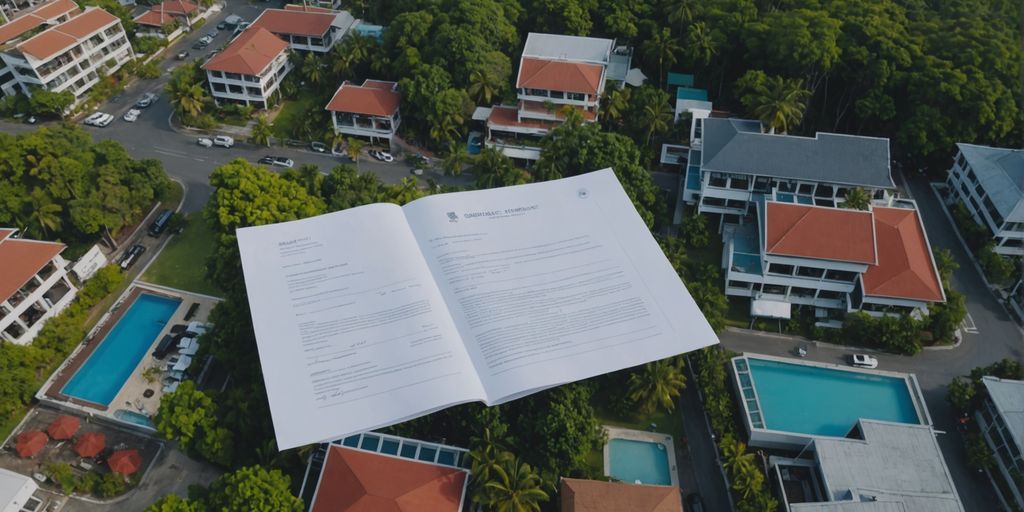Transferring property ownership in Phuket can seem complicated, but breaking it down into simple steps can make it manageable. Whether you’re a local or a foreigner, understanding the rules and procedures can help you navigate the process smoothly. From selecting the right property to finalizing the transfer at the Land Office, each step is crucial.
Key Takeaways
- Understand the legal framework for property ownership in Phuket, including restrictions on foreign ownership.
- Thoroughly research and select the right property, ensuring it meets all your needs and is free from legal issues.
- Conduct a title deed search to verify ownership and check for any outstanding debts or claims on the property.
- Prepare all required documentation and follow the legal procedures for a smooth property transfer.
- Be aware of the taxes and fees associated with property transfer and plan your finances accordingly.
Understanding Property Ownership Laws in Phuket
Legal Framework for Property Ownership
In Phuket, the legal framework for property ownership is governed by Thai law. Foreigners are not allowed to own land directly. However, they can own buildings separate from the land, such as condominiums. This distinction is crucial for anyone looking to invest in the Phuket real estate market.
Restrictions on Foreign Ownership
Foreign nationals face specific restrictions when it comes to owning property in Phuket. They can own up to 49% of the total area of all condominium units in a single project. For land, foreigners can enter into long-term lease agreements, typically up to 30 years, with options to renew. This makes it essential to consult legal experts to navigate these restrictions effectively.
Types of Property Ownership
There are several types of property ownership in Phuket:
- Freehold Ownership: This is the most straightforward form of ownership, where the owner has full rights to the property.
- Leasehold Ownership: Common among foreigners, this involves leasing the land for a specified period, usually 30 years.
- Condominium Ownership: Foreigners can own condominium units, provided they do not exceed the 49% ownership cap in any single project.
Understanding these types of ownership is vital for making informed decisions in the Phuket real estate market.
By grasping these laws and restrictions, you can better navigate the complexities of buying property in Phuket, whether you’re interested in luxury villas for sale or the best beach villas.
Selecting the Right Property
Factors to Consider
When choosing a property in Phuket, several factors come into play. Location is crucial; for instance, a luxurious 3-bedroom ocean view condo in Phuket’s Surin Beach offers stunning views and proximity to amenities. Additionally, consider the type of ownership, such as freehold or leasehold, and the property’s condition and age.
Due Diligence Process
Conducting thorough due diligence is essential. This includes verifying the title deed, checking for any legal issues, and ensuring the property matches the description. Hiring a knowledgeable real estate agent can simplify this process and help you avoid potential pitfalls.
Working with Real Estate Agents
Using a knowledgeable real estate agent in Phuket is the best method to ensure you are purchasing the perfect property for your needs. They can assist you in navigating the process of finding the ideal property and save you a lot of problems along the way. For example, they can help you find the Best Luxury Villa that fits your criteria and budget.
Selecting the right property involves careful consideration of various factors, thorough due diligence, and professional assistance to ensure a smooth and successful purchase.
Conducting a Title Deed Search
Importance of Title Deed Verification
Verifying the title deed is a crucial step in the property ownership transfer process. Ensuring the accuracy of the title deed helps prevent future legal disputes. For instance, there have been cases where buyers discovered that their property was built on a neighbor’s land or that the land area was smaller than initially stated.
How to Request a Title Deed Search
To request a title deed search, you can follow these steps:
- Visit the local Land Office in Phuket.
- Submit a formal request for a title deed search, providing necessary details such as the property location and current owner’s name.
- Pay the required fee for the search service.
- Wait for the Land Office to process your request and provide the title deed information.
Interpreting Title Deed Information
Once you receive the title deed, it’s essential to understand the information it contains. The title deed will show all historical transactions, including any encumbrances like servitudes or mortgages. If there are any real rights that are not registered, as a new owner, you have the right to dismiss these invalid rights according to Section 1299, paragraph 1, of the Civil and Commercial Code (C.C.C.).
Conducting a thorough title deed search can save you from potential legal and financial troubles in the future.
Legal Procedures for Property Transfer
Required Documentation
To transfer property ownership in Phuket, you need several key documents. These include the original title deed, the sale agreement, and identification documents of both parties. Additionally, a power of attorney may be required if either party cannot be present. Ensuring all documents are in order is crucial to avoid delays.
Steps in the Transfer Process
- Preparation: Gather all necessary documents and ensure they are complete.
- Agreement: Both parties must agree on the terms of the sale and sign the sale agreement.
- Land Office Visit: The transfer typically takes place at the land office, where the ownership will be registered. This step may require the presence of both the buyer and seller or their representatives.
- Payment of Fees: Transfer taxes and other government fees must be paid at the land office.
- Finalization: Once all fees are paid and documents are verified, the title deed is updated to reflect the new owner.
Role of Legal Experts
Legal experts play a vital role in the property transfer process. They help in verifying documents, ensuring compliance with local laws, and representing parties who cannot be present. Working with a real estate agency in Phuket can also provide additional support and guidance throughout the process.
The property transfer will generally take place at the land office where the ownership of the property will be registered upon the conclusion of the transaction.
Financial Considerations and Final Payment
Cost Breakdown
When transferring property ownership in Phuket, it’s crucial to understand the various costs involved. These include the purchase price, taxes, and administrative fees. Negotiations over who pays these taxes and fees are typical and can significantly affect the final cost of a transaction. Consulting a Treasury Department official valuation may be an important step as it would help determine the appraised value used to calculate these fees.
Payment Methods
The terms of sale must be clearly defined. This includes specifying the price, payment schedule, and any required deposit. Detailed specifications of the property should also be included, such as descriptions of the location, size, and boundaries, to prevent misunderstandings or disputes. Generally, when purchased from a developer, the Buyer will be liable for the Transfer fee, and the remaining types of taxes are borne by the Seller. However, it can always be negotiated between the parties of how the total amount of payable tax and duty is rationed among them as the law does not provide exact liability of the fee and taxes.
Timing of Final Payment
To secure the property, a deposit payment is typically required. The specific deposit amount is negotiable and should be clearly defined in the purchase agreement. The balance of the purchase price, along with any applicable taxes and fees, is usually paid at the time of transfer. It’s essential to conduct a comprehensive due diligence process to verify the property’s ownership history, land title, and the absence of any encumbrances or legal issues. It’s often advisable to engage the services of a lawyer or due diligence company for this stage.
The amount of money you will need for the taxes and administrative fees that must be paid can vary, so it’s wise to budget accordingly.
Visiting the Land Office

Services Provided by the Land Office
The Land Office in Phuket offers various services essential for property transfer. These include title deed verification, registration of property ownership, and ensuring there are no encumbrances on the property. It’s crucial to verify the property’s legal status to avoid future disputes.
Scheduling an Appointment
To ensure a smooth process, it’s advisable to schedule an appointment with the Land Office. This can often be done online or via phone. Having an appointment helps in managing time efficiently and ensures that all necessary personnel are available.
What to Expect During the Visit
When visiting the Land Office, be prepared for a thorough verification process. Both the buyer and seller, or their authorized representatives, must be present. If you cannot attend in person, you can appoint someone through a Power of Attorney. The official forms for this are Tor Dor 21 for land and house, and Or Chor 21 for a condominium. During the visit, final payments are often made, and the transfer of ownership is formalized. Short term rentals should also be discussed if applicable.
If you can’t go to the Land Office yourself, you can appoint a representative to handle the transaction on your behalf using a Power of Attorney.
Taxes and Fees Associated with Property Transfer
When transferring property ownership in Phuket, it’s crucial to understand the various taxes and fees involved. These costs can significantly impact the overall expense of the transaction.
Types of Taxes and Fees
Several taxes and fees must be considered during a property transfer:
- Transfer taxes: The land department charges 2% of the property’s registered value.
- Withholding tax: This is 1% of the appraised property value.
- Special business tax: If the property is sold within the first five years of ownership, a 3.3% tax on the appraised value is applied. Otherwise, stamp duty is assessed.
How to Calculate Transfer Costs
Calculating the total transfer costs involves summing up all applicable taxes and fees. Consulting a Treasury Department official valuation can help determine the appraised value used to calculate these fees. Negotiations over who pays these taxes and fees are typical and can significantly affect the final cost of a transaction.
Payment Procedures
The payment of taxes and fees is typically handled at the Land Office during the transfer process. Both the buyer and seller should be prepared to fulfill their respective obligations. It’s essential to clarify who is responsible for each fee, as this can be negotiated between the parties involved.
Fulfilling the necessary tax obligations and fees associated with property transfer is a critical step in ensuring a smooth transaction. These could include transfer fees, stamp duty, specific business tax, and withholding tax, with the exact amounts varying based on the property’s value and type.
Common Challenges and How to Overcome Them
Legal Hurdles
Navigating the legal landscape in Phuket can be daunting. Foreign buyers often face restrictions that can complicate the process. It’s crucial to understand the local laws and regulations to avoid any legal pitfalls. Hiring a local attorney who specializes in property law can be a wise investment. They can help you understand the nuances and ensure that all legal requirements are met.
Financial Obstacles
Financial challenges are another common issue. From securing financing to managing exchange rates, the financial aspects can be overwhelming. It’s essential to have a clear budget and understand all the costs involved, including taxes and fees. Working with a financial advisor can help you navigate these challenges and make informed decisions.
Tips for a Smooth Transfer
- Do Your Research: Understand the local market and legal requirements.
- Hire Professionals: Work with real estate agents, attorneys, and financial advisors.
- Plan Ahead: Ensure all documentation is in order and be prepared for any unexpected costs.
- Stay Informed: Keep up-to-date with any changes in local laws or market conditions.
The process of transferring property ownership in Phuket can be complex, but with the right preparation and professional help, it can be a smooth and successful experience.
By addressing these common challenges head-on, you can ensure a smoother and more efficient property transfer process. Remember, preparation and professional guidance are key to overcoming any obstacles you may encounter.
Post-Transfer Responsibilities

Registering the Property
Once the property transfer is complete, the new owner must register the property with the local authorities. This involves updating the ownership records at the Land Office. The Land Office will officially register the new owner’s name on the property’s title deed, acknowledging the transfer of ownership. You will receive a copy of the updated title deed.
Updating Ownership Records
After registering the property, it’s crucial to update all relevant ownership records. This includes informing utility companies, local government offices, and any other entities that need to know about the change in ownership. This step ensures that all future bills and correspondence are directed to the new owner.
Maintaining Legal Compliance
To avoid any legal issues, the new owner must maintain compliance with all local laws and regulations. This includes paying any necessary taxes and fees associated with property ownership. Fulfill the necessary tax obligations and fees associated with property transfer. These could include transfer fees, stamp duty, specific business tax, and withholding tax, with the exact amounts varying based on the property’s value and type.
It’s advisable to seek legal assistance from a lawyer experienced in Thai real estate law throughout the entire process. They can guide you through each stage, ensuring compliance with all legal requirements.
Conclusion
Transferring property ownership in Phuket involves several steps, from selecting the right property to finalizing the transfer at the Land Office. It’s important to conduct thorough research and due diligence to ensure a smooth process. Consulting with legal experts and experienced real estate agents can help navigate the complexities of Thai property laws and regulations. By following the outlined steps and seeking professional guidance, you can successfully acquire property in Phuket with confidence.




